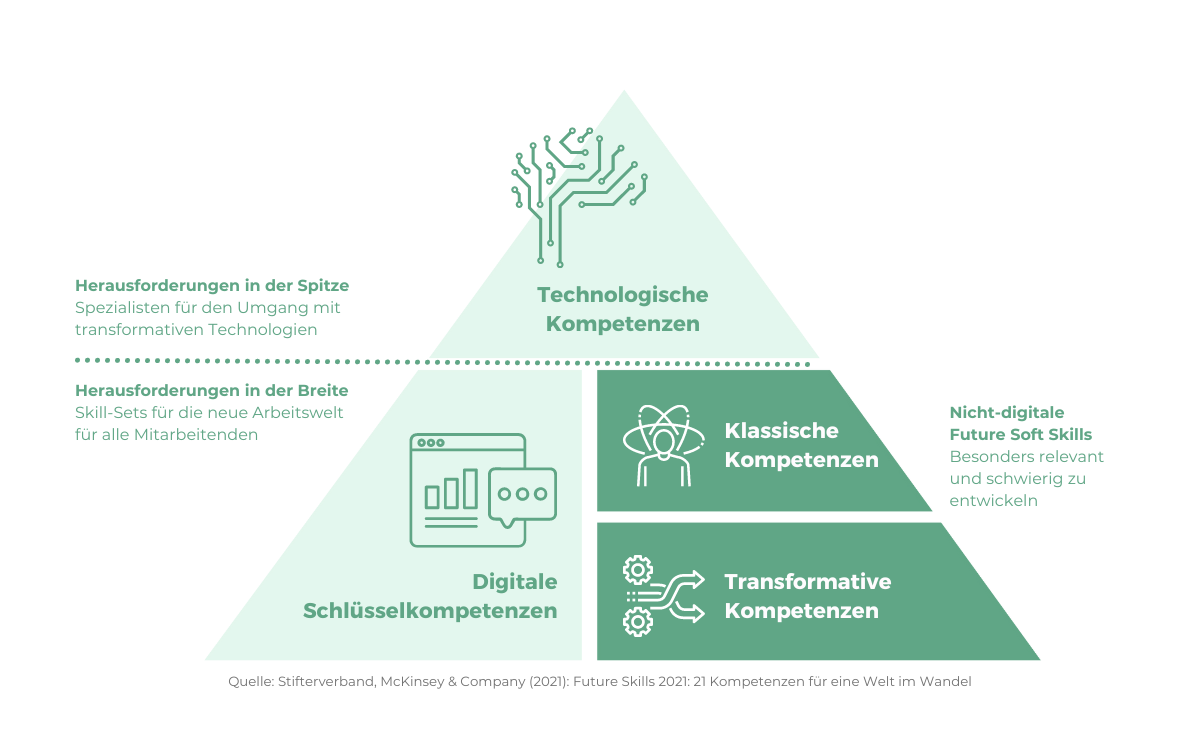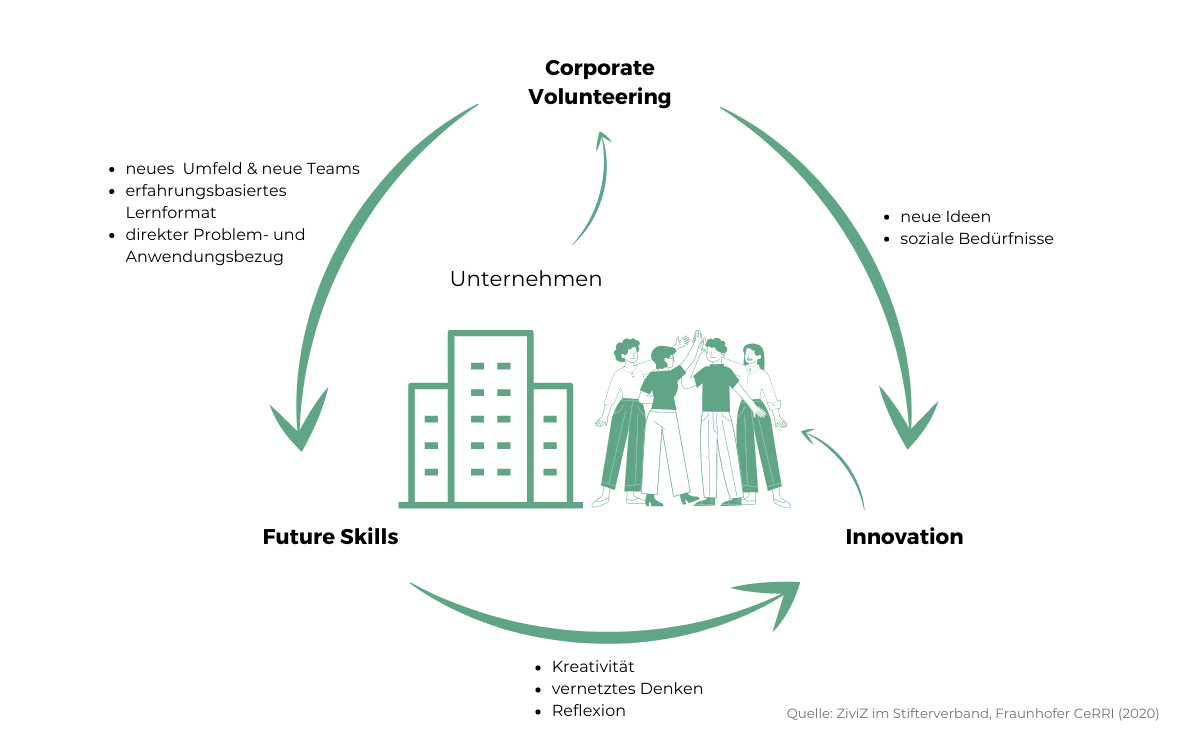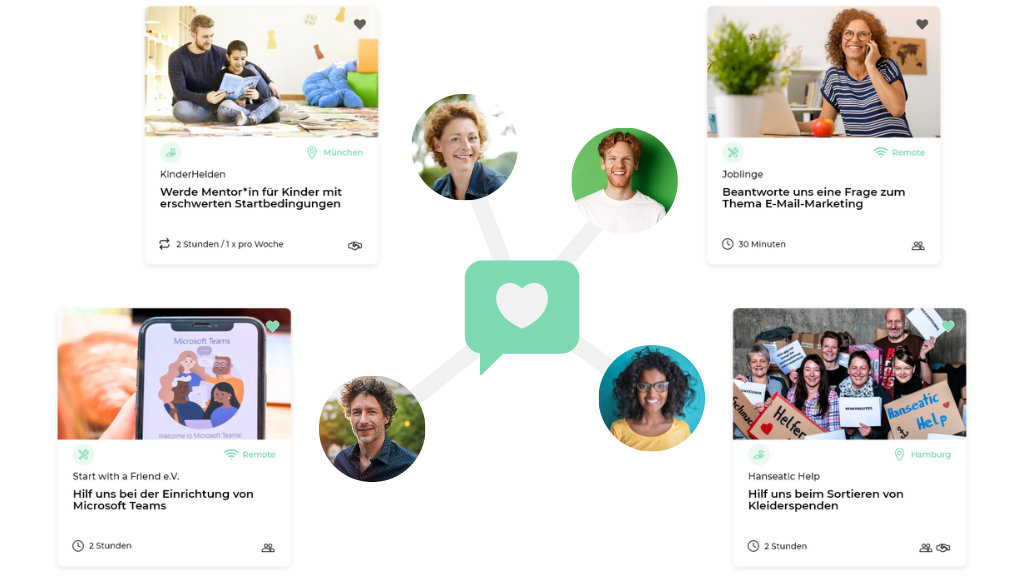Corporate Volunteering & Human Resources Development
If companies want to be successful in the long term, they need employees with future skills such as creativity, innovative competence and the ability to engage in dialog and conflict.
The problem: Traditional personnel development formats are not well suited to specifically promoting and developing these competencies. Corporate volunteering can solve this problem.

Why Future Skills?
Future Skills enable companies and their employees to adapt to rapid technological developments, find innovative solutions and operate successfully in a globally networked environment.
The working world of the future will be increasingly characterized by digital information and processes…
…Traditional job profiles will change and new requirement profiles will emerge…
…The use of digital technologies and new forms of interaction and knowledge generation will become increasingly important in almost all industries and professions.

What are Future Skills?
The Stifterverband and McKinsey have identified 21 Future Skills from four categories. The non-digital future soft skills are particularly relevant and at the same time difficult to develop.
What are Future Soft Skills?
So-called “classic competencies” are the basic building block for the professional success of each individual employee and for the success of companies as a whole. “Transformative competencies” are central to being able to address and solve the major societal challenges of our time.
Classical competences
Solution capability
The ability to handle specific tasks for which there are no ready-made solutions. Judgment and a structured approach are used.
Creativity
Includes generating original improvement ideas, whether for existing business or communication processes, or for innovations such as new products.
Entrepreneurship & initiative
Acting proactively and independently, without direct instructions or external incentives, while identifying opportunities, taking risks, and using resources effectively to implement innovative ideas and create value.
Intercultural communication
Targeted, effective and appreciative interaction between people from different cultural backgrounds to minimize misunderstandings and enable successful collaboration.
Resilience
Overcome difficult situations and resistance without experiencing long-term impairment. Focused and responsible performance of assumed duties. Early identification and addressing of risks. Adaptability. Confident in dealing with technological or societal changes.
Transformative competencies
Judgement
Critically examine societal challenges such as environmental, social and democratic goals, the UN Sustainable Development Goals and a sustainable circular economy. Sound evaluation of scientific findings and media coverage.
Innovation competence
Ability to generate innovation in a professional or personal context, whether in the form of products, services, processes, or activities. The aim is to help address societal challenges while ensuring independence, for example in relation to cyberattacks or changes in specific supply chains. It involves questioning the status quo and implementing new ideas.
Mission Orientation
Developing a clear mission as well as creating a compelling mission narrative. It involves the ability to inspire, persuade and motivate people to pursue common goals and effect positive change.
Change competence
Ability to develop effective plans to implement change goals while having a deep understanding of how groups, institutions, networks, and systems work and interact. Openness and willingness to embrace and support sustainable cultural change.
Dialogue and conflict skills
Overcoming barriers between different disciplines and functions. Reconcile tensions and resolve dilemmas. Understanding conflicting perspectives and how to deal with ambiguity. Courage for open debate and the free expression of opinions.

Future soft skills and innovation through corporate volunteering
Traditional HR development measures are not well suited to promoting non-digital future soft skills. Corporate volunteering is an exciting solution to this challenge.
How Corporate Volunteering Promotes Future Soft Skills
Corporate volunteering is a low-threshold, experiential learning venue for future soft skills with direct relevance to problems and applications.
It can be easily and continuously integrated into the daily work routine, is scalable and significantly less expensive than traditional personnel development measures.
In volunteering, employees in non-profit organizations work together in unusual interdisciplinary team constellations.
They leave their comfort zone and are confronted with new tasks and challenges.
Get a change of perspective in new work contexts.
They get to know people with whom they had no previous points of contact.
They are encouraged to find innovative approaches and to use existing resources efficiently.
About purpozed
purpozed is the digital all-in-one solution for corporate volunteering. Our platform is made for companies that want to offer their employees a simple, year-round and impactful volunteer program. Likewise, purpozed is also ideally suited as an additional building block for existing corporate volunteering activities.


Curious?
You want to find out more about purpozed? Then let’s talk with pleasure! Or simply explore purpozed yourself:

